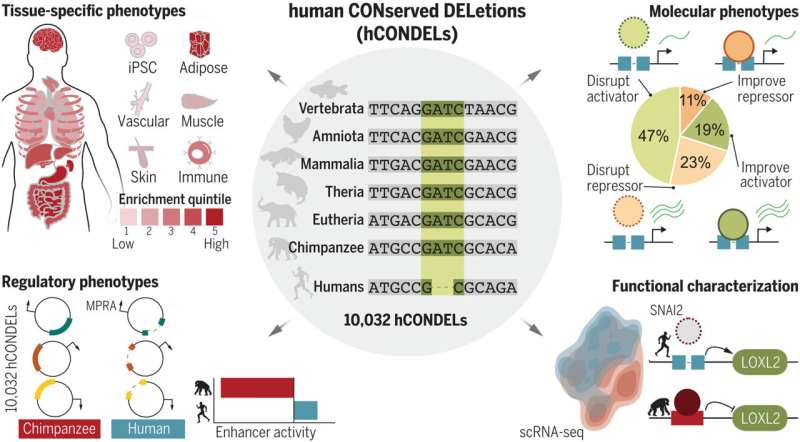Information ‘deleted’ from the human genome may be what made us human

What the human genome is lacking compared with the genomes of other primates might have been as crucial to the development of humankind as what has been added during our evolutionary history, according to a new study led by researchers at Yale and the Broad Institute of MIT and Harvard.
The new findings, published April 28 in the journal Science, fill an important gap in what is known about historical changes to the human genome. While a revolution in the capacity to collect data from genomes of different species has allowed scientists to identify additions that are specific to the human genome—such as a gene that was critical for humans to develop the ability to speak—less attention has been paid to what’s missing in the human genome.
For the new study researchers used an even deeper genomic dive into primate DNA to show that the loss of about 10,000 bits of genetic information—most as small as a few base pairs of DNA—over the course of our evolutionary history differentiate humans from chimpanzees, our closest primate relative. Some of those “deleted” pieces of genetic information are closely related to genes involved in neuronal and cognitive functions, including one associated with the formation of cells in the developing brain.
These 10,000 missing pieces of DNA—which are present in the genomes of other mammals—are common to all humans, the Yale team found.
The fact that these genetic deletions became conserved in all humans, the authors say, attests to their evolutionary importance, suggesting that they conferred some biological advantage.
“Often we think new biological functions must require new pieces of DNA, but this work shows us that deleting genetic code can result in profound consequences for traits make us unique as a species,” said Steven Reilly, an assistant professor of genetics at Yale School of Medicine and senior author of the paper.
The paper was one of several published in Science from the Zoonomia Project, an international research collaboration that is cataloging the diversity in mammalian genomes by comparing DNA sequences from 240 species of mammals that exist today.
In their study, the Yale team found that some genetic sequences found in the genomes of most other mammal species, from mice to whales, vanished in humans. But rather than disrupt human biology, they say, some of these deletions created new genetic encodings that eliminated elements that would normally turn genes off.
The deletion of this genetic information, Reilly said, had an effect that was the equivalent of removing three characters—”n’t”—from the word “isn’t” to create a new word, “is.”
“[Such deletions] can tweak the meaning of the instructions of how to make a human slightly, helping explain our bigger brains and complex cognition,” he said.
The researchers used a technology called Massively Parallel Reporter Assays (MPRA), which can simultaneously screen and measure the function of thousands of genetic changes among species.
“These tools have the capability to allow us to start to identify the many small molecular building blocks that make us unique as a species,” Reilly said.
More information:
James R. Xue et al, The functional and evolutionary impacts of human-specific deletions in conserved elements, Science (2023). DOI: 10.1126/science.abn2253
Citation:
Information ‘deleted’ from the human genome may be what made us human (2023, April 27)
retrieved 28 April 2023
from https://phys.org/news/2023-04-deleted-human-genome.html
This document is subject to copyright. Apart from any fair dealing for the purpose of private study or research, no
part may be reproduced without the written permission. The content is provided for information purposes only.
For all the latest Science News Click Here
For the latest news and updates, follow us on Google News.

